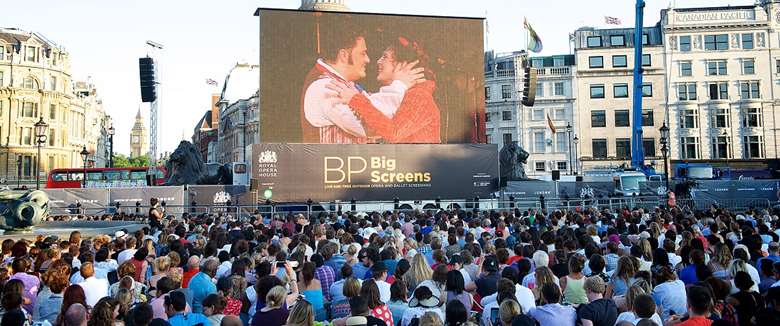is arts sponsorship by fossil fuel companies a thing of the past?
Simon Mundy
Monday, October 26, 2020
Where can music find ethical sources of funding?

Elliott Franks/ROH
The announcement by the Royal Concertgebouw, Amsterdam's leading concert venue, that it was ditching the sponsorship of Shell at the beginning of this year was jolting. As a statement of commitment to the climate change cause from a major music organisation it was in line with the current political mood and probably with a fair proportion of Dutch public opinion. As the most established and (in audience terms) conservative venue in the country, ending a relationship with a company that had long been a flagship of the nation's success was remarkable. It was a decision also taken by the other big arts institutions around Museumplein, the Rijksmuseum and the Van Gogh Museum and followed demonstrations by a protest group called Fossil Free Netherlands.
Shell and the Concertgebouw itself played the issue down, merely saying that the corporation had decided not to renew its membership of the hall's 'business club', but there is little doubt that the pressure from demonstrations, or the threat of them, was fraying the nerves and making the cost of resistance higher than the benefits of the membership subscription.
In many ways this is illustrative of the way perceptions of acceptability in the links between corporate money and the arts have changed. Campaigns are easier to organise than they used to be, thanks to social media, and the arts are keen to attract younger audiences who are more likely to be put off by association with industries no longer considered wholly beneficial. The row over the Sackler family's patronage of the National Portrait Gallery and Tate Gallery recently, given the connection to opiod promotion in the US pharmaceutical market, led to sudden and damaging withdrawal of funds (and for the family the humiliation of the removal of naming rights they had paid millions for).
Ever since sponsorship began to become important for the arts in the 1970s there have been calls for boycotts. Then, the arguments were often over connections companies had with the apartheid regime in South Africa, like Barclays Bank. Gradually, in the 1980s, the attention switched to tobacco. This was a big blow to music because the cigarette companies were among the most generous sponsors. The classical side of EMI's Classics for Pleasure label variously sported the logos of John Player, Lambert and Butler, and W.D. & H.O. Wills. In Belfast, Gallaher remained a major sponsor long after London had reversed out of tobacco. It owned Philip Morris and, in perhaps the oddest tobacco sponsorship of all, backed the Benson & Hedges Singing Competition at Aldeburgh. I remember vividly the competition in 1982 for personal reasons but also for the odd sight of Sir Peter Pears presenting the prizes flanked by the trade mark Golden Girls models, sporting their gold sashes. Just imagine how much disapproval would be heaped on the doorstep of The Maltings for that now!
Arts organisation have learned to be like political parties – asking about skeletons in cupboards before they add the logo to their image
Shell, though, was a massive investor. An Anglo-Dutch conglomerate, like Unilever, its headquarters sat in the tower next to the Royal Festival Hall. Its full time arts sponsorship director was a knowledgeable and highly respected executive. Perhaps the most valuable partnership, in musical rather than money terms, was the Shell-LSO Scholarship, a superb scheme that gave many of our finest orchestral musicians crucial support when they were young and just joining the profession. Those were the days when North Sea oil was considered by everybody to be saving the country's finances. There seemed no shame in the arts being helped along the way. As far as the climate was concerned, then the warnings were about the prospect of a new ice age, not global warming.
A trawl through the current sponsor listings of the UK's major concert halls and orchestras suggests arts organisations are much more careful than they used to be. None seem to flaunt connections with companies that are likely to attract controversy. There are bound to be some that could be made culpable of something unsavoury if enough digging was done, however arts organisation have learned to be like political parties – asking about skeletons in cupboards before they add the logo to their image. For the most part squeaky clean trusts, foundations and legal firms seem to be the partners of choice, with a sprinkling of insurers, brokers, electronics and hospitality companies adding to the mix.
It has always been difficult for the arts to serve its wide public and its narrow collection of patrons with equal enthusiasm. There is always a tension between general access and privilege, even if the latter is actually providing the finance for the former to happen. Nonetheless the pendulum does appear to have swung firmly to the side of reputational caution. In these dire times for arts balance sheets, who is it safe to turn to?